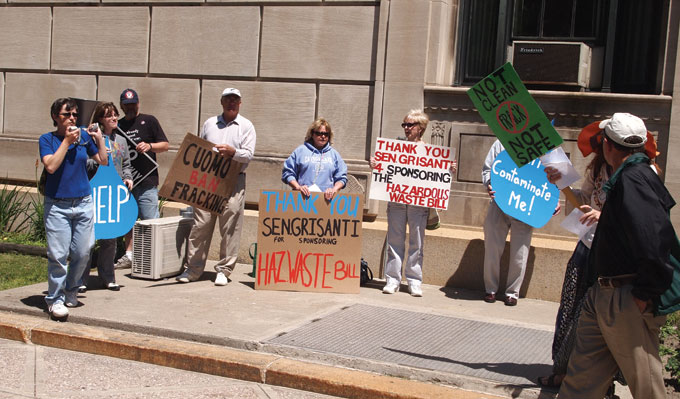Who's Carrying Water For Whom?
by Geoff Kelly

There are several items before state legislators in these waning days of the session that relate to deep-well, horizontal hydraulic fracturing, or fracking, the drilling technique that lobbyists for the gas and oil industry have advocated relentlessly as a means to exploit expensive-to-reach gas pockets in the state Marcellus Shale.
One (A07400, S5592) is a bill that would extend for one year a moratorium on the issuance of permits for deep-well, horizontal fracking. That bill, we’re told, will not be acted upon this session. The current moratorium, imposed by Governor David Paterson, expires in July.
Another (A7013, S4616) is a bill classifying the waste created by gas and oil drilling operations as hazardous, thus subjecting its disposition and treatment to regulation and oversight from which it is currently exempt.
Finally, there is a bill (A5318A, S3798) that aims to create a new regulatory regime for water withdrawal in the state. Water rights and regulations in New York are a patchwork: They are determined idiosyncratically by commissions in the Delaware and Susquehanna river basins, for example, while in the rest of the state riparian law prevails, whereby all water users in a watershed enjoy equal rights to water, which is held in public trust.
The bill was drafted last year by lawmakers in conference with industrial water users and a number of big environmental advocacy organizations, according to Jack Ossont of the Coalition to Protect New York (www.coalitiontoprotectnewyork.org), a group that opposes the new legislation.
Attorney Rachel Treichler, who practices law in the Finger Lakes region, has worked with Ossont to identify what they consider to be fatal flaws in the bill. Among them:
• The bill does not contain language explicitly protecting New York’s abiding riparian rights scheme; that is to say, it opens the door for the rights of some water users to be considered more important than the rights of other water users.
• The bill does not set a fee schedule for water use, which elicits a question: How will the New York State Department of Environmental Conservation, which has been eviscerated by budget cuts, enforce a new regulatory regime if that regime does not create funding to hire new regulators?
• Most worrisome to Ossont and Treichler, perhaps, the legislation sets a threshold of 100,000 gallons per day, below which no withdrawal permits are required. Ossont says that’s typical of laws that have been instituted in other states, but it creates a loophole big enough to drive a water tanker though for big industrial users: Deep-well, horizontal fracking operations, for example, require millions of gallons of water per well. But for various reasons, one of which is certainly to skirt permitting issues, gas drillers will contract with small water haulers to deliver multiple tankers of water, rather than with just one. You might have a dozen 8,000-gallon trucks making multiple deliveries, each under its own livery, and each delivering less than 100,000 gallons per day.
Ossont would like to see the threshold set much lower, perhaps to 10,000 gallons per day. He and Treichler would also like to see any water withdrawal legislation in New York require permitted users to designate an end use for the water they take, so the DEC knows if it’s being used for fracking or being bottled and sold as drinking water.
The legislation was passed by the Assembly unanimously last month. It was supposed to reach the Senate floor for a vote on Monday but was removed from the agenda, reportedly after some heated debate among senators.
“Obviously there’s been some dissension among the ranks in terms of some of the comments have been submitted to legislators,” says Ossont.
CPNY has submitted a FOIL request for all memos and emails associated with the drafting of the legislation. The DEC’s lawyers have told CPNY that they didn’t think they’d be able to respond until June 30—after the legislative session ends on June 20. More on this soon.
—geoff kelly
blog comments powered by Disqus|
Issue Navigation> Issue Index > v10n24 (Week of Thursday, June 16) > Week in Review > Who's Carrying Water For Whom? This Week's Issue • Artvoice Daily • Artvoice TV • Events Calendar • Classifieds |









 Current Issue
Current Issue